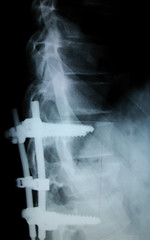A study* published in the February 15, 2011 issue of Spine, shows that spinal fusion surgery in patients with chronic low back pain leads to worse long-term outcomes – including a lower rate of return to work – compared to non-surgical treatment.
In this study the researchers compared 725 lumbar fusion cases to 725 randomly selected controls selected from a pool of workers’ compensation patients with chronic low back pain who underwent non-surgical conservative treatment such as physical therapy, exercises, etc. Final treatment outcomes included return to work, disability, and use of strong pain medications at two years follow-up.
In nearly all outcome categories it was worse for patients who had spinal fusion surgery. Only 26% of the spinal fusion patients returned to work after 2 years compared to 76%of those under conservative treatment. Also, 27% of patients in the surgical group had repeat surgery while 36% experienced some type of complication.
Eleven percent of the surgical patients had permanent disability, compared to 2% of the non-surgical patients. Most spinal fusion patients continued using opioid drugs after surgery with many taking higher doses. There were also more deaths in the spinal fusion group. The average days off work was greater for the surgical group compared to the non-surgical group (1,140 days off vs. 316 days off).
At a time of continued controversy over the role of spinal fusion surgery and the fact that this procedure has increased exponentially over the last decade despite lack of evidence that it improves patient outcomes, the results of this study raises questions about the long-term effectiveness of spinal fusion surgery.
Lead researcher Trang H. Nguyen, MD who practices occupational medicine in Cincinnati, Ohio, and his co-researchers write, “This [spinal fusion surgery] is offered to improve pain and function, yet objective outcomes showed increased permanent disability, poor return to work status, and higher doses of opioids.” They also note the lack of evidence supporting the use of spinal fusion for degenerative disc disease, herniated discs, of radiculopathy – the diagnoses present in most of the workers in the study. Their conclusion is that spinal fusion should be “cautiously considered” in workers’ compensation patients and then only for patients with diagnoses for which spinal fusion has proven specifically effective.
*Nuyen T, Randolph DC, Talmage J, et al. Long-term Outcomes of Lumbar Fusion Among Workers’ Compensation Sunjects: A Historical Cohort Study. Spine Feb 15, 2011; 36(4):320-331
From the Desk of Dr. Karl R.O.S. Johnson, DC.....
Spinal Fusion Surgery Results in Worse Outcomes than Non-Surgical Treatments in Patients with Back Injuries
Posted by Dr. Karl R.O.S. Johnson, DC on Mon, Oct 31, 2011
1 Comment Click here to read/write comments
Topics: low back pain, spinal fusion, back surgery




